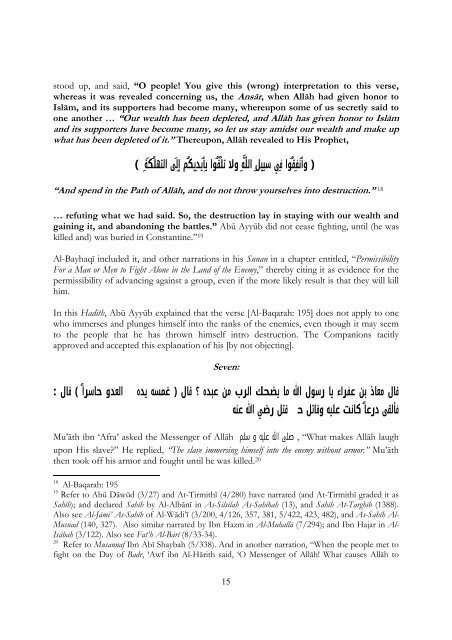the-islamic-ruling-on-the-permissibility-of-self-sacrificial-operations-suicide-or-martyrdom
the-islamic-ruling-on-the-permissibility-of-self-sacrificial-operations-suicide-or-martyrdom
the-islamic-ruling-on-the-permissibility-of-self-sacrificial-operations-suicide-or-martyrdom
Create successful ePaper yourself
Turn your PDF publications into a flip-book with our unique Google optimized e-Paper software.
stood up, and said, “O people! You give this (wr<strong>on</strong>g) interpretati<strong>on</strong> to this verse,<br />
whereas it was revealed c<strong>on</strong>cerning us, <str<strong>on</strong>g>the</str<strong>on</strong>g> Ansār, when Allāh had given h<strong>on</strong><strong>or</strong> to<br />
Islām, and its supp<strong>or</strong>ters had become many, whereup<strong>on</strong> some <strong>of</strong> us secretly said to<br />
<strong>on</strong>e ano<str<strong>on</strong>g>the</str<strong>on</strong>g>r … “Our wealth has been depleted, and Allāh has given h<strong>on</strong><strong>or</strong> to Islām<br />
and its supp<strong>or</strong>ters have become many, so let us stay amidst our wealth and make up<br />
what has been depleted <strong>of</strong> it.” Thereup<strong>on</strong>, Allāh revealed to His Prophet,<br />
﴿ وأ َنفِق ُوا فِي سبِيلِ الل َّهِ ولا تل ْق ُوا بِأ َيدِيك ُم إِل َى التهل ُك َةِ ﴾<br />
“And spend in <str<strong>on</strong>g>the</str<strong>on</strong>g> Path <strong>of</strong> Allāh, and do not throw yourselves into destructi<strong>on</strong>.” 18<br />
… refuting what we had said. So, <str<strong>on</strong>g>the</str<strong>on</strong>g> destructi<strong>on</strong> lay in staying with our wealth and<br />
gaining it, and aband<strong>on</strong>ing <str<strong>on</strong>g>the</str<strong>on</strong>g> battles.” Abū Ayyūb did not cease fighting, until (he was<br />
killed and) was buried in C<strong>on</strong>stantine.” 19<br />
Al-Bayhaqī included it, and o<str<strong>on</strong>g>the</str<strong>on</strong>g>r narrati<strong>on</strong>s in his Sunan in a chapter entitled, “Permissibility<br />
F<strong>or</strong> a Man <strong>or</strong> Men to Fight Al<strong>on</strong>e in <str<strong>on</strong>g>the</str<strong>on</strong>g> Land <strong>of</strong> <str<strong>on</strong>g>the</str<strong>on</strong>g> Enemy,” <str<strong>on</strong>g>the</str<strong>on</strong>g>reby citing it as evidence f<strong>or</strong> <str<strong>on</strong>g>the</str<strong>on</strong>g><br />
<strong>permissibility</strong> <strong>of</strong> advancing against a group, even if <str<strong>on</strong>g>the</str<strong>on</strong>g> m<strong>or</strong>e likely result is that <str<strong>on</strong>g>the</str<strong>on</strong>g>y will kill<br />
him.<br />
In this Hadīth, Abū Ayyūb explained that <str<strong>on</strong>g>the</str<strong>on</strong>g> verse [Al-Baqarah: 195] does not apply to <strong>on</strong>e<br />
who immerses and plunges him<strong>self</strong> into <str<strong>on</strong>g>the</str<strong>on</strong>g> ranks <strong>of</strong> <str<strong>on</strong>g>the</str<strong>on</strong>g> enemies, even though it may seem<br />
to <str<strong>on</strong>g>the</str<strong>on</strong>g> people that he has thrown him<strong>self</strong> intro destructi<strong>on</strong>. The Compani<strong>on</strong>s tacitly<br />
approved and accepted this explanati<strong>on</strong> <strong>of</strong> his [by not objecting].<br />
Seven:<br />
:<br />
(<br />
قال معاذ بن عفراء يا رسول االله ما يضحك الرب من عبده ؟ قال )<br />
فألقى درعا ً كانت عليه وقاتل حتى قتل رضي االله عنه<br />
غمسه يده في العدو حاسرا ً<br />
قال<br />
Mu’āth ibn ‘Afra’ asked <str<strong>on</strong>g>the</str<strong>on</strong>g> Messenger <strong>of</strong> Allāh صلى االله عليه و سلم , “What makes Allāh laugh<br />
up<strong>on</strong> His slave” He replied, “The slave immersing him<strong>self</strong> into <str<strong>on</strong>g>the</str<strong>on</strong>g> enemy without arm<strong>or</strong>.” Mu’āth<br />
<str<strong>on</strong>g>the</str<strong>on</strong>g>n took <strong>of</strong>f his arm<strong>or</strong> and fought until he was killed. 20<br />
18 Al-Baqarah: 195<br />
19 Refer to Abū Dāwūd (3/27) and At-Tirmithī (4/280) have narrated (and At-Tirmithī graded it as<br />
Sahīh); and declared Sahīh by Al-Albānī in As-Silsilah As-Sahīhah (13), and Sahīh At-Targhīb (1388).<br />
Also see Al-Jāmi’ As-Sahīh <strong>of</strong> Al-Wādi’ī (3/200, 4/126, 357, 381, 5/422, 423, 482), and As-Sahīh Al-<br />
Musnad (140, 327). Also similar narrated by Ibn Hazm in Al-Muhallā (7/294); and Ibn Hajar in Al-<br />
Isābah (3/122). Also see Fat’h Al-Bārī (8/33-34).<br />
20<br />
Refer to Musannaf Ibn Abī Shaybah (5/338). And in ano<str<strong>on</strong>g>the</str<strong>on</strong>g>r narrati<strong>on</strong>, “When <str<strong>on</strong>g>the</str<strong>on</strong>g> people met to<br />
fight <strong>on</strong> <str<strong>on</strong>g>the</str<strong>on</strong>g> Day <strong>of</strong> Badr, ‘Awf ibn Al-Hārith said, ‘O Messenger <strong>of</strong> Allāh! What causes Allāh to<br />
15


